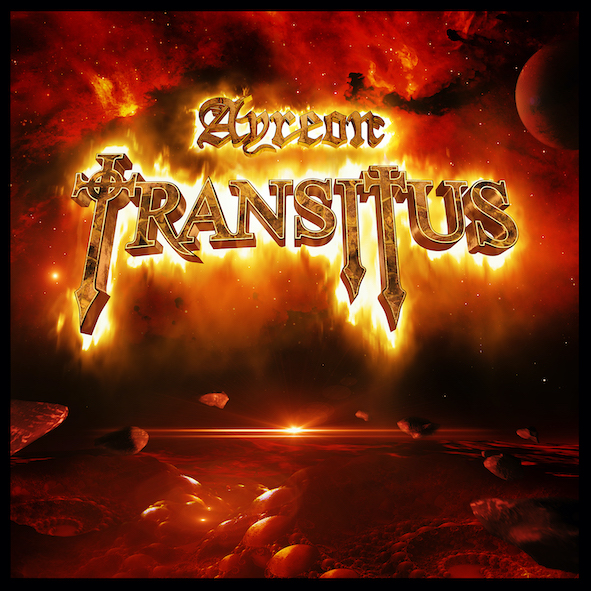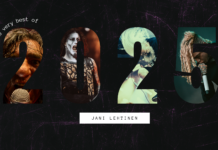Can love transcend space and time? Can it go beyond the concepts of right or wrong? Can it be above society’s standards of what is acceptable? Can pure love even survive in this world? These are just some of the questions that come to mind while listening to AYREON’s latest album, “Transitus,” a classic tragic romance, but with a supernatural twist.

The narrative almost reads like a Victorian Gothic novel and, though maybe not in the classic sense of Anne Radcliffe’s tales, it definitely has some elements of Thomas Hardy and Emily Brontë mixed together. As such, the spirit world and life after death play quite a major role in the way Abby and Daniel’s romance plays out in the end, as do the ideas that governed society in that time period. To get the setting clear, Victorian society is well organized and stratified, based on hierarchy. It is a community where everyone has a certain role to play and deviating from the script may have serious consequences, like being disowned by one’s family for bringing shame on the household with reckless behavior. This is where the tale of the star-crossed lovers, Daniel and Abby, takes place.
A. Two Worlds Now One
“You will last forever, I see how she lights up your face.”
The idea of a love so powerful that it can transcend space and time, and exist even after death, is the driving force in this story. As per the introduction, Abby and Daniel are a happy couple, “…head-over-heels and completely smitten with each other,” who overcame society’s strict rules in the name of their happiness. However, as was the case with Shakespeare’s tale, “…their love was doomed even as it started,” and they don’t find a happy ending in this life. As if battling prejudice and biased opinions wasn’t enough, they had to weather the storms of grief, guilt, tragedy, and even tackle the supernatural.
As such, while Daniel is in Transitus following his unexpected demise, he convinces the Angel of Death to listen to his story and help him prove Abby had nothing to do with his death (“I must go back and let her know; I need to clear her name”). To gain her sympathy he recounts the story of their first meeting and how, for both of them, it was love at first sight: “Then I saw her, the future opened wide / I realized the past was gone, a new life had begun” (Daniel) // “I know this is true, I know you feel it too” (Abby).
Beyond the obvious similarity to Romeo and Juliet (defying society, dying in the name of love), this romance is also reminiscent of Catherine and Heathcliff – the main couple from Emily Brontë’s 1847 novel “Wuthering Heights” – whose love story transcends the realm of life and is only fulfilled in death. After a series of grim events, Abby also finds herself in Transitus, where she is at last reunited with Daniel and free of society’s constraints: “No more shame, no more blame / Erased from time, released from life / Beyond these gates, our future waits / The Great Beyond, two worlds now one.” This is quite a roller-coaster of emotions.
B. Talk of the Town
“You don’t give a damn about protocol!”
While love is indeed the central theme of “Transitus,” such motifs as prejudice and status/class are deciding factors in how people view certain aspects of life. The Dumb Piece of Rock, Daniel’s imaginary friend from childhood, has some profound insight into this matter: “They will never accept her and won’t understand / That you belong together, regardless of status or race.” In other words, intolerance ruled the Victorian society of 1883, and servants mixing with the masters was not seen as appropriate behavior.
This societal view on the boundaries between the classes is shared by both Daniel’s brother, Henry, and by Daniel’s father, who care more about status and what the people may say than about actual happiness and joyful life. In Henry’s opinion, Daniel and Abby’s love story is not something to be celebrated, but something to be destroyed as, “You will bring our great house down / You’re the talk of the town.” Since status and prejudice seem to go hand-in-hand, Henry believes that Abby is after the family’s money – “I know you want her, but don’t you trust her / Our wealth is all she craves” – and tells their father about the affair.
Daniel’s father has some strong opinions on the matter as well, believing that, “We don’t mix with the staff, we keep to our own.” Since Daniel broke those rules by consorting with Abby he has “made this house a joke” and brought shame to their name, for which he must atone and leave the estate. The difference in mentality is extremely evident in Daniel’s response to his father’s monologue on proper behavior, as he’s wondering “How can you be so twisted, why do you think so small / Why do I keep crashing into your blinding wall!” with the notion of a “blinding wall” being equal to etiquette, rules, and position in society, which Daniel’s father view so highly.
Side note – nice play on words there, as “twisted” is such a great allusion to Dee Snider’s former band, TWISTED SISTER.
C. This Human Equation
“But they can be amazing, although they don’t look it.”
This is the philosophical song on the album, as the Angel of Death and the Furies try to make sense of the human race and its dual nature. Going back and forth between positive adjectives (“Yes they can be charming, uniquely disarming, naive but enchanting”) and negative ones (“You’d think they were crazy, I’d almost say… stupid”) the dialogue is reminiscent of “The Human Compulsion” from the 2017’s “The Source,” albeit more detailed. The pairing of phrases is quite interesting to observe (ex. “They pretend to be decent, then turn out to be bad”) as this structure points to a balance in human nature, good and bad being really in equilibrium with one another.
While the Angel of Death and the Furies are fascinated by Daniel’s story and people’s reaction to his relationship with Abby, they agree that, “This human equation, is driving us crazy.” Nonetheless, they are both amused and confused by the choices humans make, the way they navigate life, and the boundaries they face (“This human equation, success and frustration / Wealth and starvation, moral stagnation”) even if the harmony between logic and passion is not always there. In the end, the Angel concludes that that humans are “…well-mannered, endearing, yes dare I say… nice!”
D. Message from Beyond
“I bring a message from beyond.”
Despite the scientific and technological progress made in the nineteenth century, belief in the existence of the spirit world was at an all-time high during the Victorian era, and séances were a common past time activity for the aristocrats. So it is not a stretch to have Spiritualism play such a big role in this story. This is where Lavinia comes in, and her storyline is crucial to the way certain events unfold.
Lavinia is a medium who can communicate with the dead, reason why she had a vision of Daniel in the moment of his death (“Then I saw his face, the very moment he died / From out of nowhere he materialized”). Remembering this link to Lavinia (“But as I died, I had a vision / Her mother came to me”), Daniel appears to her again and convinces her that Abby is innocent (“She’s not guilty, she did not kill me”), knowing that people will blame her for his untimely death. The fact that the vocal melodies in both “Condemned Without a Trial” and “She is Innocent” are similar is a clear indication of not only the discrepancies between Henry and Daniel’s mindset but also of Daniel’s understanding of how Victorian society casts blame on the ones they perceive as being inferior. Lavinia is also the one who, in cahoots with Henry, delivers a fake message to Abby, telling her that “he is waiting there for you,” and pushing her to do something horrible.
Prior to all of this, Daniel tries to reach and comfort Abby, who feels his presence, even if she doesn’t see him (“Am I imagining you’re near? / I feel you all around me”). Their dialogue in the hauntingly beautiful “Hopelessly Slipping Away” is more proof of how strong their bond is and how deeply they feel for one another. Abby can’t live without Daniel (“I’ve nothing left worth living for / I yearn to be with you”) while he wants her to continue without him (“But you must try to let me go / And start your life anew”). Both of them are slipping away in different directions yet they seem to be at peace with the situation.
E. Transitus
“Forever lost in limbo bound for…”
Also known as Limbo or Purgatory, Transitus is the intermediate place between Heaven and Hell, where the souls of the “not quite dead” await passage to either the Great Beyond or the Underworld. According to lore, this is also the place where the souls of those that died violent deaths and didn’t have time to settle their affairs go to until they manage to somehow find peace and move on. This place is ruled by the Angel of Death and her Furies, and this is where Daniel, Lavinia, and Abby’s souls go. For each, the experience is different.
Daniel feels like “a lonely soul at a crossroads” wondering what happened to him to wind up in this strange dimension. He questions whether this is “eternity or insanity” and if he is “just a ghost.” Lavinia has a hard time believing that she’s dead (“No! I won’t accept this is my fate”) and tries to redeem herself saying that she “was misled and confused.” The Angel’s reply to both Daniel and Lavinia’s question “So who the hell are you?” reveals a lot about the characters’ morality and nature. Since Daniel was a good, kind person the Angel is saddened by his passing and replies “I hate to be the one to have to tell you, you have come to the end” but on the bright side “You’re about to ascend into the great beyond.” Given the fact that Lavinia was more wicked and deceitful, the Angel is “glad to be the one who gets to tell you / You have come to the end, you’re about to descend into the underworld.” Everybody gets what they deserve from the Angel.
Now, in Abby’s case, Transitus is a place of peace and serenity, because “nothing could be worse than the hell she’s escaped from.” She accepts her end with grace and calm as she feels empty because her “dream of happiness [was] destroyed.” All sense of fear abandoned her and now she is “Fee of guilt and shame / Alone and purposeless, spared of all the blame.” Without Daniel by her side she’s got “no reason left to try”, yet the two of them are reunited and can start a new “eternity, just you and me.”
Betrayal, death, love, ghosts, guilt, and prejudice are the main lyrical themes of “Transitus” and Arjen Lucassen had done an incredible job of weaving them together into a narrative that is as jarring as it is endearing. It’s hard not to feel for Abby and Daniel when their love is so harshly put to the test. All is well that ends well even if it is in the afterlife, right? A lot of emotions will be felt as the story, and the music, make their way into your heart and soul.
Written by Andrea Crow
Recent posts
[recent_post_carousel design=”design-1″]





